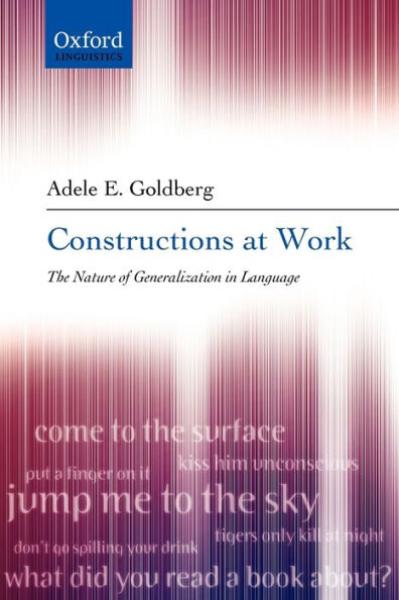Description
Constructions at Work is divided into three parts: in the first Professor Goldberg provides an overview of constructionist approaches, including the constructionist approach to argument structure, and argues for a usage-based model of grammar. In Part II she addresses issues concerning how generalizations are constrained and constructional generalizations are learned. In Part III the author shows that a combination of function and processing accounts for a wide range of language-internal and cross-linguistic generalizations. She then considers the degree to which the function of constructions explains their distribution and examines cross-linguistic tendencies in argument realization. She demonstrates that pragmatic and cognitive processes account for the data without appeal to stipulations that are language-specific.
This book is an important contribution to the study of how language operates in the mind and in the world and how these operations relate. It is of central interest for scholars and graduate-level students in all branches of theoretical linguistics and psycholinguistics. It will also appeal to cognitive scientists and philosophers concerned with language and its acquisition.
"Constructions at Work --clear, engaging, and persuasive --is recommended for anyone who is interested in understanding grammar. All linguists, in other words." --Language
"[Adele Goldberg] has written an excellent book in which she manages to bring together evidence from a variety of different sources to erect a building where constructions in a systemic network on the one hand and general cognitive abilities on the other hold so much weight. Constructions at Work is a must-have book. The author's elegance and clarity of vision, her knowledge of research beyond linguistics proper, as well as her empathy with the reader and her honesty about the no-so-clear cases, are engaging. The book's broad cognitive orientation makes it all the more appetizing." --Folia Linguistica
"Usage-based construction grammar provides an excellent framework for tracking the development from specific to general patterns in child language. Goldberg's book is an accessible demonstration of how constructionist approaches, combined with certain cognitive, semantic, and pragmatic factors, provide a viable means of describing both adult and child language without innate universals and abstract underlying structures." --Journal of Child Language
"Constructions at Work is a "must have" volume. Rarely has a linguist combined expertise of such a high standard from different disciplines such as theoretical linguistics, psycholinguistics, and cognitive psychology. Goldberg brings language and the extra-linguistics world one step closer together, and reveals how, in a simple yet brilliant way, our brains may transform cognition into communication." --Linguist List
"In Adele Goldberg's new book, Construction Grammar comes of age. Goldberg combines traditional linguistic argumentation with all the tools of cognitive science: statistical and corpus-based analysis, data from experiments on processing and language acquisition (many carried out by the author herself), and evidence from broader-based phenomena in cognition. The vision of language embodied in Constructions at Work emerges as a robust alternative to mainstream thought in linguistics, one that maintains high aspirations to explanation in psychological as well as crosslinguistic terms."--Ray Jackendoff, Professor of Philosophy and Co-Director, Center for Cognitive Studies, Tufts University
"Bursting with original ideas--a real testament to the richness and power of the constructionist approach, and required reading for anyone interested in psychologically plausible models of grammar."--Michael Tomasello, Co-Director, Wolfgang Kd"ohler Primate Research Center, Max Planck Institute for Evolutionary Anthropology
"This is an extremely important book that marks a significant advance in language science. Goldberg asks two deep questions: How do learners acquire generalizations that make it possible to produce and comprehend utterances outside their direct experience? and Why are languages the way they are? She brings an impressive array of data to bear on these issues, including language-internal facts, cross-linguistic patterns, and psycholinguistic experiments. In the process, she successfully confronts a number of difficult challenges head on, dealing with several long-standing and difficult phenomena. The result is deeply satisfying. Even more, it is convincing."--Jeffrey L. Elman, Chancellors' Associates Distinguished Professor of Cognitive Science, University of California, San Diego
Product Details
- Oxford University Press & Brand
- Mar 15, 2001 Pub Date:
- 0199268525 ISBN-10:
- 9780199268528 ISBN-13:
- 280 Pages
- 9.08 in * 6.34 in * 0.64 in Dimensions:
- 1 lb Weight:




